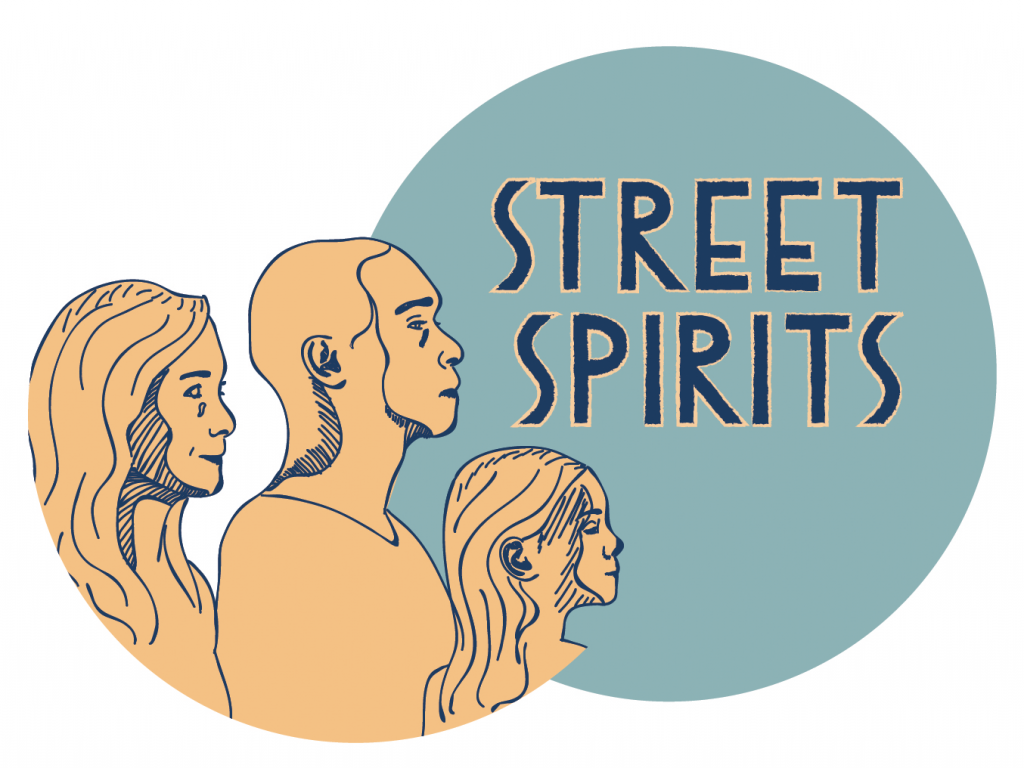
In West Berkeley, not far from Fourth Street’s bright, bustling retail mecca, rows of old trailers hide in the shadows of solemn industrial warehous- es, doors shut and curtains drawn. A break in the buildings casts one street corner in bright afternoon sunlight. Vida, dressed comfortably in gray sweats and a brightly colored hair band, perches on a wooden bar stool beside a bicycle over- laden with bulging plastic shopping bags.

Vida poses with her belongings in West Berkeley. (Julia Irwin)
Vida was raised on a farm in Idaho, where she grew up milking cows, tending fields, and playing outdoors—riding bikes, hiking, fishing, and camping. “I loved camping most,” she says. “I’ve always liked to be in the mountains; it’s so peaceful.” As a child, she dreamed of being a forest ranger.
In her late 20s, Vida moved to Los Angeles seek- ing something “new and different.”
“And it’s different, all right!” she says. “It’s so fast-paced, compared to where I’m from.”
After relocating, Vida began to struggle. She was unable to find a job and experienced some “person- al issues” that, as she says, “really knocked me off my peg.” Vida has been sleeping in a tent for the three years since.
Now 32, Vida has been living in the Bay Area for about six months. She is still sleeping outside, but is doing better these days. “It took me a little time to crawl up and out of the gutter, but I did it,” she says. “I got it now; I can handle it. Frank says I can handle it,” she laughs, glancing at her friend, busy hammering several large wooden boxes together. “So I can handle it!”
Vida has found a welcoming community among other unhoused folks. “I see a lot of positive atti- tudes and nice people,” she says. She talks about how people are quick to stand up for each other, noting that she recently found a ready support sys- tem when a romantic relationship turned abusive.
Still, as a young woman living outside, Vida sometimes finds herself in scary situations. “You just gotta be careful wherever you go, because some people see that you’re a girl and think you won’t do nothin’, that you’re weak,” she cautions. “But other men I’ve become friends with have been really re- spectful; they see my size, my shape, and they have my back.”
Vida keeps herself entertained by reading books, which she borrows from the “little free libraries” dotting residential neighborhoods. “It’s like watch- ing a movie, but you don’t need power,” she laughs.
Vida enjoys Michael Patterson’s detective stories, and children’s book author Sharon Creech. Her fa- vorite Creech novel is Chasing Redbird, which tells the story of an 11-year-old girl in Kentucky who finds an overgrown trail and, following the death of a beloved aunt, channels her grief into clearing the trail by herself. “It’s my favorite book,” says Vida, “because it reminds me that I can do anything I put my mind to.”
‘Just because you’re homeless doesn’t mean you’re a bad per- son; it just means you’re strug- gling—and everybody struggles.’
Vida pauses for a moment, then continues: “Homeless people too—we can do anything we put our minds to; we just have to keep trying and never give up. I wish people knew that just because you’re homeless doesn’t mean you’re a bad person; it just
means you’re struggling—and everybody struggles. It just means that you’re transient, that you’re tran- sitioning into a different part of your life.”
Despite this optimism, living outdoors has often strained Vida’s positivity—small hardships add up, like the difficulty in finding a place to take a show- er. “A lot of the time, it’s just a birdbath,” she says. “That’s what we call it—you find a bathroom and take a little birdbath in the sink. It’s rough, and it’s hard to keep that belief that you can do it.”
Though she is still living on the street, Vida has an escape plan. When she’s ready, she says, her family has offered to bus her back to Idaho, though they are wary of her propensity to skip town for new adventures. “They want to make sure that I’m going to stick to it,” she says.
She isn’t quite sure what she’ll do once she moves back to her home state, but Vida looks forward to seeing her family and friends again. “Being here [in the Bay Area], I’m new, and I feel like I’m by myself sometimes,” she says.
One path that appeals to her is caretaking. She is considering finding work as a Certified Nursing As- sistant—her mother’s lifelong career. “I like helping people; I want to help take care of the elderly,” Vida says.
Until then, though, Vida hopes the City of Berke- ley will ease up on its unhoused population. “Like, Frank here is building these storage boxes and shel- ters,” she gestures, “so they went and made a law saying you can’t do that.”
Frank has thus far been preoccupied with the boxes he is constructing, and I had long since taken him to be entirely deaf to our conversion. Proving me wrong, he cuts in, eagerly asserting that his boxes do not violate Berkeley’s new “sidewalk or- dinance,” which prohibits objects that occupy more than nine square feet of sidewalk space. He tells me that had previously been constructing larger boxes, intending for them to serve primarily as temporary shelters for unhoused people, and was forced to downsize following the passage of the sidewalk ordinance.
Indignant, Vida shakes her head. “He’s paying it forward and helping others who don’t have a place to stay—they should be donating supplies and stuff to help him, rather than trying to knock him off his peg for doing the right thing!”
Street Spirits is a feature in which someone who lives on the street tells us their story.
Julia Irwin is a writer, a recent UC Berkeley graduate, and a soon-to-be law school student.
